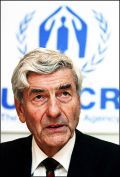Some improvements in Darfur but lots more needs to be done: UN refugee chief
KHARTOUM, Sept 27 (AFP) — Violence and human rights abuses in Sudan’s conflict-torn Darfur region have diminished, but both Khartoum and the two rebel groups have to work harder to bring peace, UN High Commissioner for Refugees Ruud Lubbers said Monday.
 Lubbers, who ended a tour of Chad and Sudan on Monday, told a news conference that he had witnessed several marked improvements in Darfur during his visit over the weekend.
Lubbers, who ended a tour of Chad and Sudan on Monday, told a news conference that he had witnessed several marked improvements in Darfur during his visit over the weekend.
“The commitment on the part of the government of Sudan to end violence and prefer the effective ceasefire is visible on the ground,” he said, adding that another “positive finding” was that internally displaced people could be accessed much more than “three or four months ago.”
But he added that violence was continuing and that there were “still a number of incidents on the ground.”
Lubbers, who headed a delegation comprising US Assistant Secretary of State for Population, Refugees and Migration Arthur Eugene Dewey, and senior European Union and Japanese officials, stressed that he wanted the rebel groups and Sudan to speed up the deadlocked peace process.
“I think both have to move forward quickly in the direction I have indicated,” he said, appealing them to set aside their differences in the interests of the “victims of Darfur.”
Lubbers, who met Sudanese Vice President Ali Osman Taha and Minister of State for Foreign Affairs Naguib al Khair Abdul Wahab Monday, said Khartoum had informed him that 190,000 refugees had returned of their own will.
“The UNHCR does not have that information,” he said, adding that Sudan’s social affairs minister, who informed him of the phenomenon, had complained that “some people do not believe our information when it comes to the return process.”
Lubbers remained mute on his proposal for a limited autonomy to Darfur to resolve the conflict, made before the start of his current tour last week.
“My thesis was and is that while respecting the integrity of the territory of Sudan, one has to move to some form of autonomy,” he said, adding that the junior foreign minister had told him Khartoum’s priorities were first on “humanitarian matters, then on security matters, then on political matters and finally on reconstruction.”
Earlier Tuesday, Khartoum newspapers reported that Sudan’s junior foreign minister, Naguib al-Khair Abdel Wahab, had said self-rule for the non-Arab minorities of Darfur was an issue that would not be considered until a later stage in troubled peace talks with rebel negotiators in Nigeria.
Lubbers said Khartoum wanted his agency, whose role here has been limited by the fact that its mandate is greater for refugees than for internally displaced people, “to be present and expand its protection role in relation to the uprooted people of Sudan.”
The bloodshed in Darfur began in February 2003 when rebels rose up against Khartoum to demand an end to the alleged marginalisation of their region — mainly people by black Africans and one of the poorest in Sudan.
The government’s was to give Arab militias known as the Janjaweed a free rein to crack down on the rebels and their supporters.
The Janjaweed are accused of murder, rape and torture.
According to the UN, some 190,000 people have crossed over into neighbouring Chad from Sudan to escape the conflict — in which some 50,000 people have been killed — and which the United States has called a “genocide.”
Lubbers sidestepped a question on the Janjaweed — now a blanket term in Darfur where victims of any violence point the blame on the militia — said it was unclear if they were an “organised unit” or if there are “different Janjaweed.”
The refugee chief said that his mission, comprising main donors — Washington, Brussels, Tokyo, Berlin” aimed to raise “110 million dollars for Darfur.”
